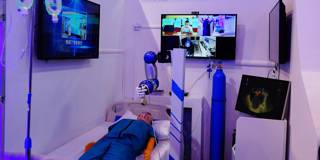Machine learning and big data promise to make the process of discovering and applying new cancer treatments faster and more effective than ever. But to realize these technologies' potential, we will need pragmatic, globally standardized policies governing the collection and use of medical data.
MUNICH – We are entering a transformational period in medical science, as traditional research techniques combine with massive computing power and a wealth of new data. Just recently, Google announced that it has developed an artificial intelligence (AI) system capable of outperforming human radiologists in detecting breast cancer. And that is merely the latest example of how machine learning and big data are leading to new medical diagnostics, treatments, and discoveries. To realize AI’s enormous potential, however, we must develop a pragmatic and globally agreed approach to governing the collection and use of “real-world data.”

MUNICH – We are entering a transformational period in medical science, as traditional research techniques combine with massive computing power and a wealth of new data. Just recently, Google announced that it has developed an artificial intelligence (AI) system capable of outperforming human radiologists in detecting breast cancer. And that is merely the latest example of how machine learning and big data are leading to new medical diagnostics, treatments, and discoveries. To realize AI’s enormous potential, however, we must develop a pragmatic and globally agreed approach to governing the collection and use of “real-world data.”